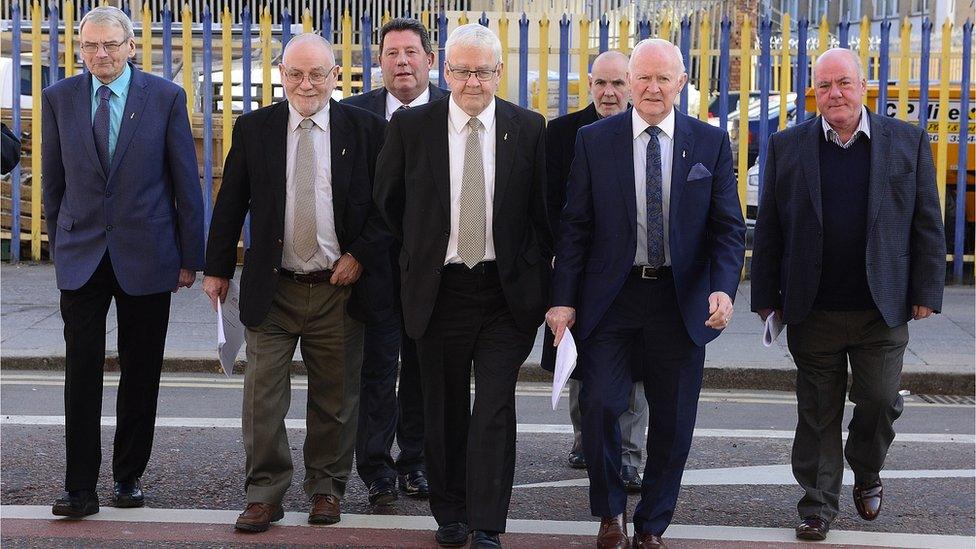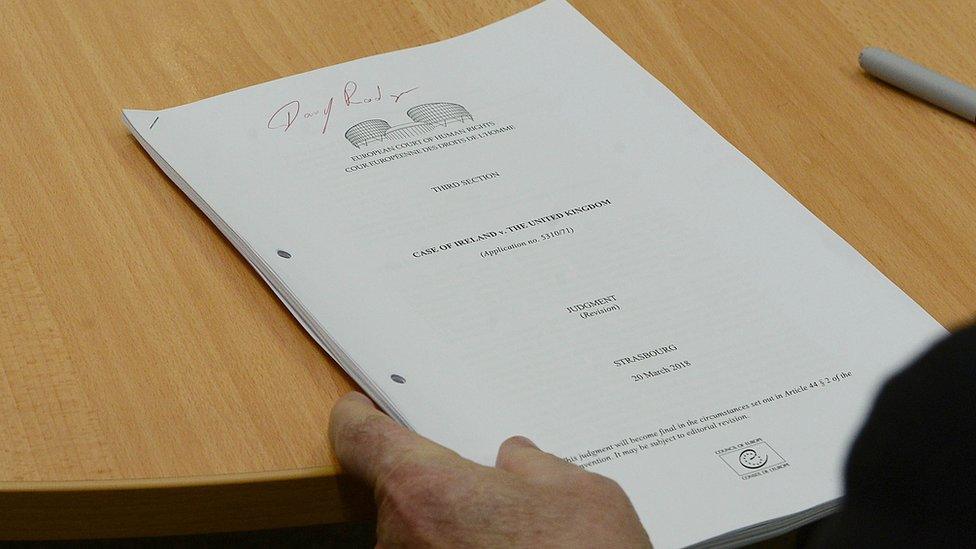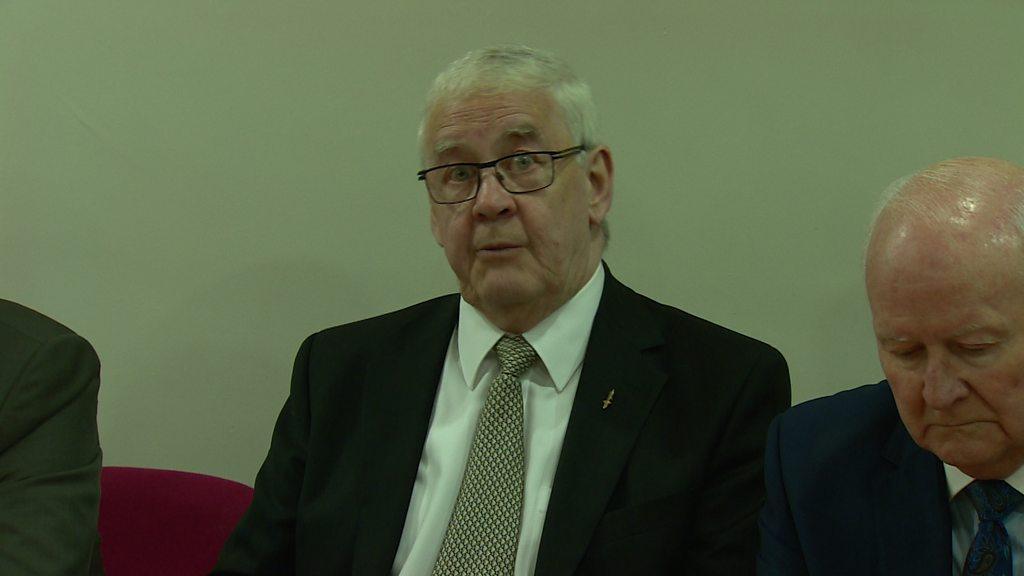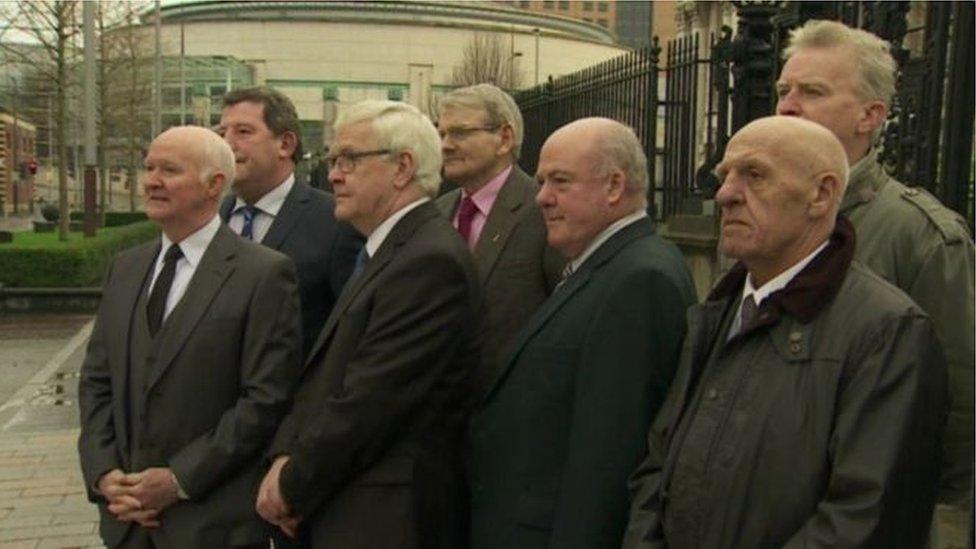Irish call over 'Hooded Men' case rejected
- Published
Francie McGuigan, one of the hooded men, said there was 'no weakness in our determination'
A request to find that men detained during internment in Northern Ireland suffered "torture" has been rejected by the European Court of Human Rights.
A group known as the hooded men claimed they were subjected to torture by the Army in 1971.
Their lawyers have called on the Irish government to appeal the latest ruling.
In 1978, the European Court of Human Rights held that the UK had carried out inhuman and degrading treatment, but fell short of defining this as torture.
Allow X content?
This article contains content provided by X. We ask for your permission before anything is loaded, as they may be using cookies and other technologies. You may want to read X’s cookie policy, external and privacy policy, external before accepting. To view this content choose ‘accept and continue’.
In 2014, the Irish government said it would ask the European Court to revise the 1978 judgement.
Tánaiste (deputy prime minister) Simon Coveney said the ECHR's decision would be "fully considered by the government".
He said Tuesday's judgement did not alter the court's original ruling in 1978 that the men "suffered inhuman and degrading treatment".
"I am due to meet the men in the coming weeks and look forward to hearing their views," he added.
'Not giving up'
The 14 hooded men alleged they were subjected to torture sanctioned by the state.
They said they were forced to listen to constant loud static noise; deprived of sleep, food and water; forced to stand in a stress position and beaten if they fell.
The men also said they were hooded and thrown to the ground from helicopters - despite being at near ground level, they had been told they were hundreds of feet in the air.
Francie McGuigan, one of the hooded men, said they were "far, far, far from giving up".

The so-called hooded men have claimed they were tortured by the Army in 1971
"While any one of us have breath left in our bodies we will fight it and we will keep on fighting it.
"With the exception of two, the rest of us are now over 70 and I don't see a weakness in our determination yet.
"At this stage, the European Court has missed a great opportunity to try to stamp out torture, be it here in Ireland or any corner of the world."

Analysis
by Vincent Kearney, Home Affairs Correspondent
This ruling will be greeted with sighs of relief in the corridors of power at Whitehall and much further afield.
A number of other countries, including the USA and Israel, have relied on the European Court's 1978 judgement to defend interrogation techniques used by their security forces.
A decision to revise that judgement and find that the five techniques used on the hooded men constituted torture could have had huge repercussions.
It would have left the British government and others facing potentially huge claims for damages.

He added: "I think there's a strong onus on the Irish government to take this appeal and push it for all it's worth."
Another one of the hooded men, Jim Auld, told BBC Talkback that he was "angry and frustrated" with the ECHR's decision.
"It's important for people to understand that none of us had any self gain out of this, we embarked on this programme to try and create the conditions where no government could torture their citizens."
Darragh Mackin, a solicitor who represents some of the hooded men, said: "In circumstances where the Belfast High Court, the London Supreme Court has ruled that these techniques are torture, it is difficult to comprehend how the European Court has missed this opportunity.

The ECHR found that it had not been demonstrated that there was new evidence that would have a "decisive influence on the original judgement"
"It is deeply regretful that we are left with only the consideration that it is procedural gymnastics that have allowed for this ruling to continue and for this grave injustice that the hooded men suffer and continue to suffer."
The five techniques the men were subjected to were later banned by the prime minister at the time, Edward Heath.
No new facts
"There was therefore no justification to revise the judgment."
The revision request was dismissed by six votes to one with only the judge elected in respect of Ireland issuing a dissenting opinion.
Allow X content?
This article contains content provided by X. We ask for your permission before anything is loaded, as they may be using cookies and other technologies. You may want to read X’s cookie policy, external and privacy policy, external before accepting. To view this content choose ‘accept and continue’.
The Irish government had said new facts had emerged in a television documentary aired in June 2014.
It had subsequently submitted that a psychiatrist, Dr L., who had been heard as an expert for the UK in the original proceedings had misled the court by saying the effects of the ill-treatment were short-lived.
In fact, it was alleged, he had known that the use of the five techniques had long-lasting and severe effects.
The Irish government also referred to other documents released from archives which it said showed that the UK Government had tried to prevent the ECHR from accessing the full truth about the five techniques.

What was internment?
Northern Ireland Prime Minister Brian Faulkner used the Special Powers Act to introduce internment without trial for those suspected of being involved in violence on 9 August 1971.
During the first morning of Operation Demetrius, 342 people were arrested. More than 100 were released two days later as it became increasingly clear that the RUC's intelligence, based on records more than a decade old, was arguably useless.
Most of the new IRA leadership had escaped army raids by hiding in safe houses or heading south of the border.
Internment stayed in place and by the eve of direct rule from London in 1972, the internees numbered 924.

Surviving members of the group launched a bid for a judicial review against a PSNI decision in 2014 that there was not enough evidence to warrant an investigation into their treatment.
Allow X content?
This article contains content provided by X. We ask for your permission before anything is loaded, as they may be using cookies and other technologies. You may want to read X’s cookie policy, external and privacy policy, external before accepting. To view this content choose ‘accept and continue’.
As well as seeking a judicial review of that decision, the legal bid also challenged decisions by the chief constable, Department of Justice and Northern Ireland Office as "constituting a continuing failure" to order a full and independent investigation.
The written High Court judgement, external indicated that it meant that the question of an investigation should be revisited but it "did not prescribe how the issue should be taken forward".
- Published20 March 2018

- Published17 February 2017

- Published15 February 2017
